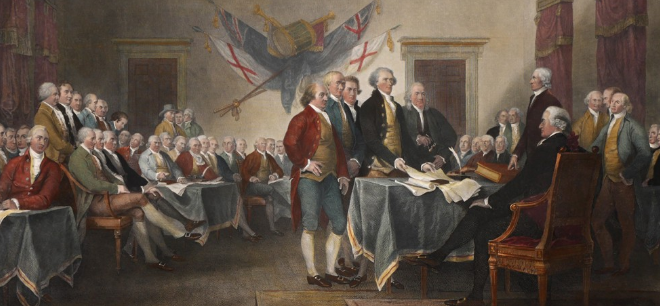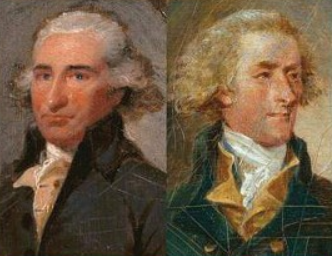The Top 100 American Founders (2021 Edition)
For a justification of these rankings check out this video.
This is a subjective list of the top 100 most important American Founders based on their roles leading up to, during and after the Revolutionary War. The part they played in the Early Republic is also factored in.
Honorable Mentions
These are the Founders who were on last year’s list but were pushed out.
William Whipple - Declaration signer and General at Saratoga. Planted a Liberty Tree which still stands.
William Ellery - Signed the Declaration and Articles of Confederation.
Thomas Nelson Jr. - Organized the Yorktown Tea Party, became Governor of Virginia, ordered his house fired on when the British were thought to be inside.
Top 100
100. Gunning Bedford - Major player in limiting the size of government under the Constitution, which he signed.
99. Elizabeth Freeman - Fought for her freedom in court based on the new MA constitution and won, leading to abolition in the North.
98. Daniel Shays - Led a rebellion for fair treatment of rural citizens. His resistance pushed the movement towards the Constitution.
97. Robert Treat Paine - Signed the Declaration, prosecuted Boston Massacre soldiers.
96. Philip Livingston - Attended the Albany, Stamp Act, First and Second Continental Congresses.
95. Edmund Pendleton - Chairman of the Virginia Convention which declared independence and a longtime Chief Justice of the State Supreme Court.
94. Edward Rutledge - Attended the Staten Island Peace Conference, Signed the Declaration, Governor of South Carolina.
93. Ethan Allen - Won the Battle of Ticonderoga which was the first time the colonists captured a fort.
92. Joseph Reed - Signed the Declaration. First President of Pennsylvania.
91. Ebenezer Hazard - Postmaster General throughout the Revolutionary War.
90. Stephen Hopkins - Put aside political differences within Rhode Island to focus on the Revolution. Signed the Declaration. 'My hand trembles but my heart does not.’
89. Mercy Otis Warren - Trailblazing female author. Promoted independence, published under her real name and became a leading Anti-Federalist.
88. Benjamin Harrison - Signed the Declaration and was a Governor of Virginia. His son and great grandson were both Presidents.
87. Benjamin Tallmadge - Washington's head of intelligence. Most notably the spymaster of the Culper Ring.
86. Daniel Boone - Hardworking frontiersman known more for building Kentucky than his role in the Revolution.
85. James McHenry - Surgeon in the Army, Secretary of War during Washington and Adams Administrations.
84. Phillis Wheatley - An enslaved female child who demonstrated that intelligence can be found in any human being.
83. Bushrod Washington - Long time Supreme Court Justice during the Marshall Court.
82. William Blount - Signer of the Constitution and inaugural Senator from Tennessee.
81. William Moultrie - Won an important early battle which gave the Continental Army confidence. Basically created South Carolina’s identity.
80. Esek Hopkins - First Commodore of the Continental Navy.
79. William Livingston - Signer of the Constitution. Governed New Jersey for most of the Founding Period.
78. Robert Howe - First General of the Southern Department, led a failed invasion of Florida, ran West Point, suppressed mutinies.
77. Nicholas Gilman - Continental Officer through the entire war, signed the Constitution, inaugural US Congressman and longtime Senator.
76. Casimir Pulaski - Father of the American Cavalry.
75. Lord Sterling - Major General who fought bravely with the men, trusted by Washington to stand in as Commander in Chief while George was meeting with Congress.
74. Caesar Rodney - Rode through the night in a thunderstorm to vote in favor of the Declaration, without whom the resolution would not have passed. Governor of Delaware.
73. Haym Salomon - Jewish Founding Father who helped fund the Continental Army.
72. Anthony Wayne - After notable events in the Revolutionary War, became Commander of The Legion of the United States in the Northwest Indian War.
71. John Paul Jones - ‘Father of the US Navy’
70. George Rogers Clark - ‘Father of the Northwest Territory’
69. Benjamin Banneker - First Black American to become famous as a scientist and used his platform to publicly discuss civil rights with the leaders of his day.
68. Jonathan Trumbull - Governor of Connecticut. Only Royal Governor to side with the colonists and keep his job through the Revolution.
67. Alexander McDougall - Pamphleteer, Major General in the Continental Army, Secretary of the Marine.
66. Artemas Ward - First Commander in Chief when hostilities broke out in Boston. Handed his command over when Washington was appointed by the Continental Congress.
65. George Mason - One of the most respected Virginians who wrote the State Constitution and Bill of Rights. Attended the Constitutional Convention but left without signing and actively campaigned against ratification.
64. Francis Marion - The Swamp Fox. Helped General Greene win the war in the South by harassing the British with guerrilla warfare.
63. Daniel Morgan - General at Cowpens, the only historically unique military strategy devised during the war.
62. Charles Lee - Highest ranking Major General in the Continental Army for most of the war. Was a thorn in Washington's side but his rank made him extremely important.
61. William Samuel Johnson - Attended the Stamp Act Congress, sailed to London in an effort to prevent war and signed the Constitution. Represented Vermont in Congress before it was a State.
60. John Langdon - Governor of New Hampshire, signer of the Constitution, inaugural Senator, first President Pro Tempore.
59. John Sullivan - General who led an expedition against Native American in Upstate New York. Member of the First Continental Congress and twice Governor of New Hampshire.
58. Richard Montgomery - Led the assault on Montreal and Quebec. Killed in the latter and became an early martyr to the Americans.
57. Christopher Gadsden - The Sam Adams of the South. Attended the Stamp Act Congress and the Continental Congress. Created the yellow 'Don't tread on me’ flag we see everywhere today.
56. George Clymer - Treasurer of the Continental Congress. Signer of the Declaration and Constitution.
55. Paul Revere - Famous rider who helped stir up the rebellion in Boston. Underrated for his contribution to the Industrial Revolution.
54. Horatio Gates - Spent most of the war as number four Major General in the Continental Army. Celebrated in his own time but less so today.
53. Robert Hanson Harrison - George Washington's Chief of Staff during the Revolutionary War.
52. Thomas Paine - Author whose work swayed the colonists in favor of Independence and built morale within the Continental Army. 'These are the times that try men’s souls.’
51. Philip Schuyler - Major General, Served in the Continental Congress, First Senator from New York.
50. Tench Coxe - The Father of the American Economy. Created most of the financial plan which Alexander Hamilton receives credit for.
49. Lambert Wickes - Most successful Officer of the Continental Navy. Brought the war to the shores of Great Britain.
48. Henry Laurens - South Carolina leader who served as President of the Continental Congress for a time. One of the few Americans ever imprisoned in the Tower of London. Present for the signing of the Treaty of Paris.
47. George Read - Signed the Continental Association, Declaration of Independence and Constitution.
46. John Hancock - Rich kid turned Revolutionary. Signed the Declaration first and largest. Spent the rest of his life as Governor of Massachusetts.
45. Nathaniel Gorham - Played a leading role at the Constitutional Convention as Chairman of the Committee of the Whole.
44. Charles Thomson - Secretary of the Continental Congress (AKA doing all the actual labor) for the entire Revolution.
42. Henry Dearborn - Wrote historically important diary during war service. Secretary of War for the entire duration of the Jefferson Administration. Senior Officer in the Army during the War of 1812.
42. Francis Dana - Helped Washington organize the Continental Army, met with Catherine the Great as first Minister to Russia.
41. Patrick Henry - The leader of Revolutionary Virginia. That State’s first Governor. 'Give me liberty or give me death.’
40. Samuel Adams - The loudest voice in creating the Revolution. Signed the Declaration and Articles. Fell into state politics after the war.
39. James Otis - Coined the term 'no taxation without representation’ and attended the Stamp Act Congress. Lost his marbles and therefore plummeted down this list.
38. Joseph Warren - Early rebel who wrote the Suffolk Resolves. Appointed General but served on the front lines at Bunker Hill. 'I hope I shall die up to my knees in blood!’
37. David Brearley - Chairman of the Committee of Postponed Parts which settled many of the final details of the Constitution.
36. Albert Gallatin - Secretary of the Treasury through Jefferson and into Madison Administrations.
35. James Wilson - Signed the Declaration. Helped author and signed the Constitution. Associate Justice of the First Supreme Court.
34. Oliver Wolcott - Signed the Declaration, Connecticut Major General during the war, Commissioner of Indian Affairs, Governor of Connecticut.
33. Thomas Mifflin - First aide de camp to Washington, Quartermaster General, President of the Continental Congress, Governor of Pennsylvania, signer of the Constitution.
32. George Wythe - Teacher of many younger Founders. Signed the Declaration and Constitution.
31. Richard Henry Lee - Another Virginia leader. Proposed the colonies 'are, and of right ought to be, free and independent State.’. This led directly to independence.
30. Benjamin Rush - Doctor for the Founders. Signed the Declaration. Changed the way medicine is studied.
29. Baron von Steuben - Prussian General who wrote the book (literally) on how to be an American soldier. Also taught the troops basic cleanliness to cut down on diseases.
28. Marquis de Lafayette - Frenchman who volunteered to serve in the war. Distinguished himself in Battle and became an adopted son of Washington. Bonus points for going back to France and starting another Revolution.
27. Charles Cotesworth Pinckney - General who declined to be in the First Cabinet. Signed the Constitution. Minister to France. Federalist Presidential Candidate.
26. Roger Sherman - Signed all four major Founding Documents. Elder statesman during the Constitutional Convention. Main organizer of the Great Compromise.
25. Silas Deane - First foreign Minister. Secretly purchased the supplies which won the Battle of Saratoga. Returned to America on the flagship of the French Navy. The war would have been lost without his services.
24. Benedict Arnold - Yeah he was a traitor, but he's the reason America was successful in the first half of the war, sending him way up this list.
23. Timothy Pickering - Postmaster General, Secretary of War, Secretary of State. Treated with the Iroquois.
22. Aaron Burr - Yes he shot Hamilton, but he was also the Third Vice President. You don't get to that position without some pretty Revolutionary street cred.
21. George Clinton - Governor of New York throughout the Founding Period.Leading Anti-Federalist. Fourth Vice President.
20. Oliver Ellsworth - Constitution Framer (but not signer), inaugural Senator who authored the Judiciary Act of 1790, led the Senate to pass the Bill of Rights, Third Chief Justice of the Supreme Court, Envoy Extraordinary to France who ended the Quasi-War.
19. Robert R. Livingston - Early supporter of Independence. Chancellor of New York for most of the Revolution. Made Louisiana Purchase with Monroe.
18. Henry Knox - Commanded artillery during the Revolution. First Secretary of War.
17. Gouverneur Morris - Wrote most of the New York State Constitution. Helped with the Articles of Confederation. Authored the Preamble to the US Constitution. Served the first President as Minister to France.
16. John Rutledge - Attended the Stamp Act Congress, signed the Continental Association and Constitution, First Governor of South Carolina, Second Chief Justice of the Supreme Court.
15. John Marshall - A late bloomer on the Revolutionary Stage, Marshall held small roles in the first decade under the Constitution.Became the Fourth Chief Justice of the Supreme Court and arguably the most important ever.
14. Rufus King - Signed the Constitution. First Senator from New York. Minister to Britain.Last Federalist candidate for President before the party collapsed.
13. Edmund Randolph - Governor of Virginia who attended the Constitutional Convention but refused to sign. Became First US Attorney General and Second Secretary of State.
12. James Monroe - Fought in the war before going to the Continental Congress. Made the Louisiana Purchase before becoming Secretary of State and War during the War of 1812. Fifth President of the United States of America.
11. Elbridge Gerry - Signed the Declaration.Attended the Constitutional Convention but refused to sign the document on several grounds. Contributed much to the Bill of Rights, became a Minister to France, and Fifth Vice President of the United States.
10. Nathanael Greene - One of the most important Major Generals of the war.Took over the Southern Department when things looked bleak.Turned things around and was a significant contributor to America's victory.
9. Robert Morris - Financier of the Revolution. Perhaps the most powerful man in the young nation. Secretary of both Marine and Finance during the war. Signer of the Constitution.
8. John Jay - Early rebel from New York. Negotiated trade with Spain and signed the Treaty of Paris.First Chief Justice of the Supreme Court.
7. John Dickinson - Penman of the Revolution.Wrote early pamphlets against British aggression.Did not sign the Declaration on principle but went on to write the Articles of Confederation and play a leading role at the Constitutional Convention.
6. James Madison - A latecomer on the revolutionary scene, Madison shot to prominence after the war and convinced the young nation's leaders to create a new form of government. Perhaps you’ve heard of it, the US Constitution.While Madison didn’t ‘write’ the Constitution (it was the work of many hands), he had the biggest influence on it’s creation. Oh yeah, and he would be the Fourth President of the United States.
5. Alexander Hamilton - Climbed the ranks to a leadership position during the war. Major player in the Constitutional Convention. First Secretary of Treasury who built the foundation of the American financial system.
4. Benjamin Franklin - Revered by his contemporaries for his wisdom. His presence was reassuring for those signing both the Declaration of Independence and Constitution. Built America’s international reputation and contributed much to the foundation of our society in general.
3. John Adams - Ever underrated, John Adams was the quintessential American Revolutionary. From writing pamphlets before the war, to representing the United States throughout Europe, and through the First Vice Presidency and Second Presidency, Adams had the Patriot Cause boiling up to his ears.
2. Thomas Jefferson - Wrote the Declaration. Leader of the first opposition party. Second Vice President and Third President of the United States. Has an entire style of government named for him (Jeffersonian Democracy).
1.George Washington - He’s the ‘Father of the Country’ for a reason. Leader of the Continental Army. Chairman of the Constitutional Convention. First President of the United States of America. Need I say more?
Thanks for reading!
If you want to learn about a new Founder every day, subscribe to my email list or follow me on Twitter!
You can support Founder of the Day on Patreon or by purchasing some of this fun American Revolution merchandise:














